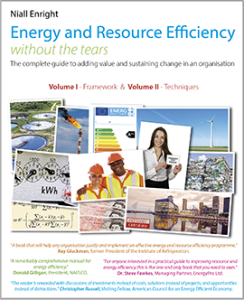 SustainSuccess participated in the government consultation on on the future of streamlined energy and carbon reporting (SECR). The government’s response was published on 18th July. This is our summary:
SustainSuccess participated in the government consultation on on the future of streamlined energy and carbon reporting (SECR). The government’s response was published on 18th July. This is our summary:
The new reporting regime follows the abolition of the Carbon Reduction Commitment (CRC) at the end of the second phase (31st March 2019 – although Annual Reports will still need to be submitted and allowances paid, so the administrative requirements will continue for a few months).
The £700m income that the CRC provided to the government will be replaced through significant increases in the Climate Change Levy (CCL), which are set to rise from 0.583 p/kWh to 0.847 p/kWh for Electricity and 0.203 p/kWh to 0.399 p/kWh for Natural Gas supplies (45% and 67% respectively, note that CCL other fuels such as LPG will also increase, see this link).
The consultation response (available here) has answered a number of important questions about the new reporting regime. However a number of key issues remain unclear, as set out below.
The basics
- When: The Streamlined energy and carbon reporting requirement starts on 1st April 2019 (it is not clear from the consultation response if this is the date where reports must be produced, e.g. relating to the 2018-19 financial period or whether this is the date for which the first report must be made i.e. relating to the 2019-20 financial period).
- Who: Reporting will be mandatory for Limited Liability Partnerships, quoted and unquoted companies with two or more of: at least 250 employees, annual turnover greater than £36m and annual balance sheet total greater than £18m. This is the definition of a large company under the Companies Act 2006.
- Organizations using less than 40,000 kWh will not be required to report. It is unclear if this applies to organizations within a larger entity or organizations that stand alone. According to the impact assessment, unquoted companies are now able to benefit from an exemption where it is not practical to obtain information. Furthermore, there is an option to exempt disclosure of information which the Directors think would be seriously prejudicial to the interests of the company.
- How: The report will appear in the Director’s Section of the Annual Report. Companies that appear in a Parent company’s report do not have to report themselves. Where a parent company is not registered in the UK but has subsidiaries that are registered in the UK, these subsidiaries, if qualifying for SECR in their own right, would need to report.
- What: For quoted and unquoted companies and LLPs, the report will include UK energy use and associated scope 1 and 2 emissions and an intensity metric. For quoted companies this report will also include global energy use (as is already the case). Transport is defined “as road, rail, air and shipping (and the associated scope 1&2 emissions)”. The choice of intensity metric “will be left to sectors and to existing best practice and guidance”. The report will include a narrative commentary on energy efficiency action taken in the financial year, but will not be required to disclose ESOS recommendations and how they have been taken forward.
- At present the report will be “backward looking as it will provide data in relation to the year of the annual report and a preceding year”. This suggests that we may report on two years at a time, and also that there will not be a requirement to provide a forward-looking disclosure (as recommended in the Task Force on Climate Disclosure), such as climate change risk statement or similar.
Impact
When the 40,000 kWh deminimis is taken into account 11,300 large companies will be in the scope of the SECR reporting requirements. There are no exemptions for companies or energy suppliers already reporting under other regimes, such as the EUETS or Climate Change Agreements.
Electronic reporting will not be mandated initially. That means that there will not be a central database of responses. However, government have said they will keep this option open for the future.
The Devil in the detail
Government has not responded to question 15-18 of the Consultation, which include important issues for participants. We were disappointed to see that some of the important issues raised by SustainSuccess still need to be clarified, such as:
- There was a question in the consultation on incentives and support to help organisations to make investments in de-carbonisation. We, along with several other respondents, suggested an extension of Climate Change Agreements (which provide rebates of the CCL in return for verified emissions reductions), from “energy intensive” sectors to “large energy consuming” sectors, such as the property sector. This would free up considerable investment and have a lower £/tonne mitigated costs than some of the existing mature CCA sectors. Property is particularly pertinent, as the Committee on Climate Change noted in their last annual report that this sector has “flat-lined” in terms of emissions reductions and needs additional incentives if it is to achieve the necessary level of emissions reduction for the UK to reach its targets.
- We raised a technical (but important) point about flaws in the “market based” reporting of electricity use (Scope 2) which currently allows organisations to buy “green electricity” (Renewable Energy Guarantees of Origin) for little or no cost and report no or zero emissions. We feel strongly that the precedent set in the CRC which means that all grid electricity is reported using a common factor, should be continued into SECR. To do otherwise would allow large organisations to hoodwink the public by claiming for themselves renewable electricity which has been paid for by all electricity users, through the green levies on all consumer’s bill. Allowing “green electricity” claims removes motivation for Boards to reduce their energy use that the SECR regime is intended to create.
- Uncertainties remain about whether complex organisations, such as investment trusts, or groups with one or more common overseas parents, can report effectively. In many ways the ability to nominate a representative organisations, as in CRC, would make sense, as long as it is clear what participants that organisation is reporting on behalf of. Without some form of consolidation, the SECR could be far from “simplified” for organisations with complex financial/corporate structures ending up with a large administrative burden to allocate emissions to legal entities rather than operational ones.
- Further guidance on the reporting requirements will hopefully provide more detail on the treatment of issues such as on-site generation, green and renewable energy tariffs, business travel, carbon offsetting, and the increasing prevalence of ultra-low emission vehicles.
As with all such schemes the devil will be in the detail.



0 Comments